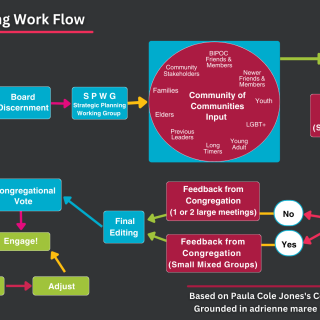Community of Communities
By Paula Cole Jones
I would like to see Unitarian Universalists begin to think of ourselves, our congregations in particular, as a community of communities. And I think it’s one of the next steps in our evolution as a a denomination, as a movement, because we we currently think in terms of a family metaphor, which is really too narrow and too small. It encompasses us in a way that I think limits our expansion.
Unitarian Universalism has a universal message. If we think of ourselves as a community of communities, then we can begin to focus on what are the interests and needs of the young adult community. What are the interests and needs of the community of families who populate our religious education, or those who potentially will come. What are the interests and needs of the communities of people of color—whether we talk specifically around ethnic groups or people of color as a larger group— What are the interests and needs of the senior population. I’m always surprised when I meet older people who are in their 60s and 70s who have only been Unitarian Universalists for a year or two. So we’re still attracting seniors, as well as having many seniors already in our membership.
Another community: there are various social justice communities within our church and beyond, We have communities of people who are, you know, they’re book clubs or music. Whether it’s the choir at your church, or whatever. Or the community that congregates on Sunday mornings.
So we have lots of different facets of community already in place. And yet we continue to think of our church as a family. So we we close the door in a sense, because families are, you know, we’re kind of like units, right? I say to people often that families have a hierarchy. You know where the authority is in a family. If we impose that on this community of communities, then basically we’re saying to people that the authority channels are very, very narrow. In a family, you know who you can bring home and who you can’t. And it’s unspoken. And we impose that metaphor on our church.
So I think that we limit our our imagination about growth, our capacity for growth, through metaphors. Metaphors are so powerful. You use the metaphor and it counters up all kinds of meaning that’s unspoken. We need to experiment with, and experience the communities of communities as a metaphor for how we will organize ourselves, and how it will grow. Because that not all of those communities are not only in our congregations but that’s our bridge to the wider community outside of our church doors. So again, I just want to encourage people to—intentionally—began to experiment with the idea of our congregations as a community of communities.
I am in a congregation that is over a thousand members we do function as a community of communities, and still we’re we’re looking at this metaphor as a way to do better. But if if we move in that direction, then young adults, and people of color, and seniors, and people interested in music, and religious Educators, can probably do deeper work at looking at how do we grow our community within the larger community. So this is not about separation. This is about strengthening the overall community.
I want to add one more piece: As we begin to look at ourselves as a community of communities, that also shifts us from being a community of just individuals. Because we can function, or we can we can act like, or think like a group of individuals, which allows for one or two or a few individuals to hinder what might be in the interest of the larger community. I think until we’re able to shift to this community of community metaphor, so that we can elevate the voices of those who are often underrepresented. And, at least, not silence or marginalized the voices of various groups. Then I think that we may be on a new path to growth.
Sophia Fahs Lecture by Paula Cole Jones: Building a Community of Communities
By Paula Cole Jones
General Assembly 2019 Event 266 Program Description Whether we consider faith formation, growth, social justice and/or dismantling white supremacy, Unitarian Universalists could use an identity update. This presentation embraces who we are and challenges who we think we are. Seeing ourselves as a...
Creating a Community of Communities
By Paula Cole Jones, Renee Ruchotzke
Paula Cole Jones introduced the notion of congregations as a Community of Communities to foster inclusion and diversity at last year’s Fahs Lecture. We’ll expand on how to introduce and begin practicing this new framing in your congregation.
Get Input When Developing Guiding DocumentsUsing the Community of Communities Model
By Renee Ruchotzke
When your congregation is developing or revisiting "guiding documents" for leaders that are endorsed by the congregation as a whole (e.g. mission, vision, covenant, bylaws, strategic plan), you will want to have an effective and inclusive process that makes space for creative ideas to emerge.


